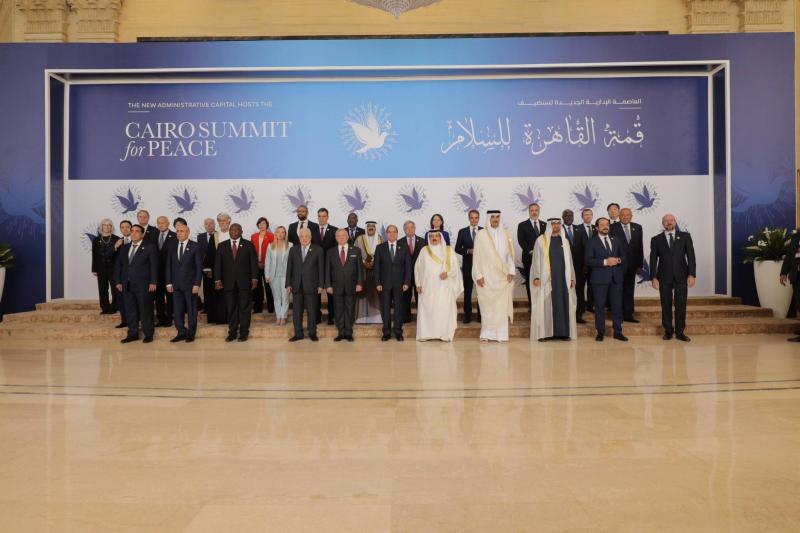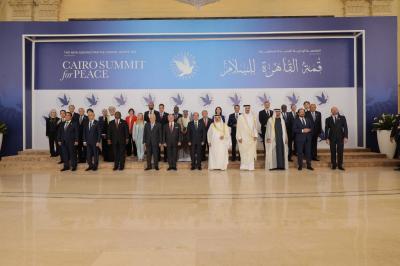Arab leaders condemned the ongoing Israeli bombardment of Gaza on Saturday, while Europeans emphasized the need to protect civilians. However, the absence of Israel and senior U.S. officials at the Cairo Peace Summit led to no agreement on how to contain the violence. Egypt, which called for and hosted the meeting, expressed hopes that participants would advocate for peace and resume efforts to support the Palestinians' decades-long quest for statehood.
The gathering ended without leaders and foreign ministers reaching a joint statement, despite the ongoing conflict next door in Gaza, which has claimed thousands of lives and resulted in a humanitarian catastrophe for the besieged enclave's 2.3 million residents. The diplomats present were not optimistic about any breakthroughs while Israel prepared for a ground invasion of Gaza aimed at eliminating Hamas, which attacked its towns on October 7, killing 1,400 people.
**Humanitarian Corridor**
French Foreign Minister Catherine Colonna stated at the summit that there is a need for a humanitarian corridor to deliver aid to civilians, which she claimed could lead to a ceasefire. Germany noted that Israel's fight against Hamas should consider the humanitarian situation in Gaza, while Britain urged the Israeli army to respect international law and exercise restraint. Italy stressed the importance of avoiding escalation.
The United States, Israel's main ally, sent its charge d'affaires in Egypt, who did not publicly speak during the summit. European Council President Charles Michel said the main goal of the summit was to "listen to each other" while adding that "we understand that we need to work together more" on issues including the humanitarian situation, preventing escalation in the region, and the peace process between the Palestinians and Israel.
**Ceasefire Efforts**
The Cairo meeting sought ways to avoid a wider war in the region, but diplomats were aware that issuing a joint statement was unlikely due to sensitivities regarding any calls for a ceasefire and whether it would include references to the Hamas attack and Israel's right to defend itself. Arab nations fear that the assault could permanently displace residents of Gaza, similar to what occurred in 1948 with the declaration of the State of Israel.
Egyptian President Abdel Fattah el-Sisi, in his speech, stated that his country opposes what he called the displacement of Palestinians into Egyptian Sinai. He emphasized that "the solution to the Palestinian issue is not displacement... but justice, by granting Palestinians their legitimate rights to self-determination, and living with dignity and security in an independent state on their land." Egypt is concerned about security near its border with Gaza in northeastern Sinai, which has faced an Islamic insurgency peaking after 2013 but is now largely suppressed.
**Jordan**
Meanwhile, Jordan's King Abdullah described the intense bombardment in Gaza as a war crime, warning that continuing along the path of conflict, which has persisted for two weeks, would only result in more death and despair. He stated at the Cairo Peace Summit, "The Israeli army is imposing a siege on civilians in Gaza, depriving them of food, medicine, and aid, and the consequences of indifference to applying humanitarian law are grave; the war on Gaza must end." He continued, "Our message to the Israeli people should be to live in peace with the Palestinians without fear."
**Bahrain**
Bahraini King Hamad bin Isa Al Khalifa reaffirmed "Bahrain's stance supporting the legitimate rights of the Palestinian people," adding that Egypt always calls for peace, the well-being of nations, and achieving stability in the region.
**Palestine**
Palestinian President Mahmoud Abbas cautioned against attempts to displace the Palestinian people from Gaza, the West Bank, or Jerusalem. He said, "Our people faces brutal aggression that violates international humanitarian law, and we demand that it stop immediately." He reiterated his complete rejection of civilian killings from both sides, stressing that "security and peace can only be achieved through a two-state solution." President Abbas explained that "the cycle of violence renews repeatedly because of the absence of justice and the legitimate rights of our people."
**Saudi Arabia**
Saudi Foreign Minister Faisal bin Farhan rejected Israel's "attempts to forcibly displace the inhabitants of Gaza." He demanded that the international community hold Israel accountable to adhere to international law, as well as the immediate opening of safe humanitarian corridors into Gaza, while also calling for an immediate halt to military escalation in the enclave, asserting that "the Kingdom stands with the Palestinian people in obtaining their rights."
**South Africa**
South African President Cyril Ramaphosa called upon all concerned nations to refrain from supplying arms to either side in the Israeli-Palestinian conflict. He stated that "Israel's use of force and bombardment of Gaza violates international law." He added: "We maintain a firm view that the attack on civilians in Israel, the ongoing siege of Gaza, and the decision to forcibly evacuate the people of Gaza, along with the indiscriminate use of force through bombardment, are violations of international law."
**France**
French Foreign Minister Catherine Colonna highlighted the need to establish a humanitarian corridor to deliver aid to civilians in Gaza, which could lead to a ceasefire. She continued, "Distributing aid to civilians, starting with those most in need, requires establishing a humanitarian corridor, which could lead to a ceasefire." She noted that French President Emmanuel Macron just announced providing humanitarian aid worth ten million euros to the Palestinians, in addition to ten million euros announced by Colonna the previous Sunday during a visit to Cairo.
**Britain**
British Foreign Secretary James Cleverly stated, "I spoke directly with the Israeli government about its duty to respect international law and the importance of preserving civilian lives in Gaza." He added, "Despite the extremely difficult conditions, I urged the Israeli army to exercise discipline, professionalism, and restraint." Cleverly noted that the international community should work together to prevent the situation in Gaza from evolving into a regional conflict, stating, "This is what Hamas wants. We have a duty to prevent instability from engulfing the region and claiming more lives, ensuring that Hamas does not prevail but rather fostering peaceful coexistence."
**Germany**
German Foreign Minister Annalena Baerbock remarked that the fight against Hamas, which "does not speak for the Palestinians," must be conducted with the utmost care for the humanitarian situation in Gaza, lest it risks turning in favor of the group. She stated, "Parents in Gaza struggling to provide drinking water for their children do not speak the language of terrorism... the fight against Hamas must be conducted with as much care as possible for the humanitarian situation of innocent men, women, and children in Gaza."
**Italy**
Italian Prime Minister Giorgia Meloni emphasized that the international community must prevent the escalation of war between Israel and the Palestinian Islamic Resistance Movement (Hamas) and set a roadmap for a two-state solution.
President Abdel Fattah el-Sisi hosted the leaders participating in the summit today, discussing the future of the peace process and the cessation of escalation in Gaza. Leaders from Qatar, Palestine, the UAE, Bahrain, South Africa, Mauritania, Libya, Cyprus, and the Prime Ministers of Spain, Greece, Italy, Iraq, as well as the Crown Princes of Kuwait and Oman are participating in the summit. Additionally, the President of the African Union Commission, the President of the European Council, and the Secretary-General of the Arab League are also attending. Representatives from Russia, China, and the United States are also expected to participate.




